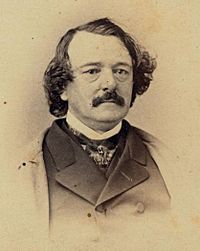Henry Taylor Blow facts for kids
Quick facts for kids
Henry Taylor Blow
|
|
|---|---|
 |
|
| Commissioner of the District of Columbia | |
| In office July 1, 1874 – December 31, 1874 |
|
| Preceded by | Office established |
| Succeeded by | Seth Ledyard Phelps |
| Member of the U.S. House of Representatives from Missouri's 2nd district |
|
| In office March 4, 1863 – March 3, 1867 |
|
| Preceded by | James S. Rollins |
| Succeeded by | Carman A. Newcomb |
| Member of the Missouri Senate | |
| In office 1854-1858 |
|
| Personal details | |
| Born | July 15, 1817 Southampton County, Virginia, USA |
| Died | September 11, 1875 (aged 58) Saratoga, New York, USA |
| Political party | Unconditional Unionist, Republican |
| Spouse |
Minerva Grimsley Blow
(m. 1840) |
| Profession | Politician, businessman |
| Signature | |
Henry Taylor Blow (July 15, 1817 – September 11, 1875) was an important American politician and businessman. He served two terms as a U.S. Representative for Missouri. He was also an ambassador to both Venezuela and Brazil. Henry Blow is also known for supporting Dred Scott in his famous fight for freedom.
Contents
Growing Up and Early Career
Henry Blow was born in Southampton County, Virginia. His parents, Captain Peter and Elizabeth Blow, owned the enslaved man Dred Scott. Henry was one of ten children. When he was young, his family moved to Huntsville, Alabama, and then to St. Louis, Missouri in 1830. In St. Louis, his father opened a boarding house.
Sadly, Henry's mother died in 1831, and his father passed away the next year. Henry was only fifteen years old. He had started studying law, but his parents' deaths meant he had to find work. He became a clerk in his brother-in-law's business, which sold paint and oil.
Building Businesses
Henry worked hard and became a partner in the business by 1836. The company was later renamed Charless, Blow, and Company. In 1844, Henry took over the manufacturing part of the business. It became known as the Collier White Lead and Oil Company. This company grew into one of the largest factories in St. Louis.
Henry Blow also started other businesses. He and his brother, Peter, created the Granby Mining and Smelting Company. Henry also led the Iron Mountain Railroad for a while. He helped set up a furnace for the iron industry in a city called Carondelet.
Family Life
In 1840, Henry married Minerva Grimsley. Her father was a wealthy saddle maker. Henry and Minerva had nine children together. Henry believed in education for his daughters, which was not common at the time. One of his daughters, Susan Elizabeth Blow, became a famous educator. She started the first public kindergarten in the United States.
In 1849, Henry moved his family to Carondelet, which was a separate city back then. He built a large Victorian mansion there.
Political Journey
Even though Henry grew up in the South, he was against slavery. His parents had owned Dred Scott. Scott was later sold to Dr. Emerson, who took him to places where slavery was illegal. When Scott returned to St. Louis, Henry Blow encouraged him to sue for his freedom. Henry even helped pay for the legal case.
The case went all the way to the Supreme Court. Unfortunately, the court ruled that enslaved people were property, not citizens. This meant Dred Scott could not be free. However, Scott later gained his freedom when Dr. Emerson's widow gave him to Henry's brother, Taylor Blow, who then freed him.
Serving in Government
Henry Blow joined the Republican Party in 1854 because they were against slavery. He was elected to the Missouri Senate and served from 1854 to 1858. In 1860, he was a delegate for Missouri at the convention where Abraham Lincoln was chosen to run for president.
In 1861, President Lincoln appointed Henry Blow as the Minister to Venezuela. He worked to improve trade between the two countries. He did not stay long, returning to the U.S. to support the Union during the Civil War.
Blow was then elected to the United States House of Representatives. He served from 1863 to 1867. He was part of the Joint Committee on Reconstruction. This committee helped write the Fourteenth Amendment to the United States Constitution, which gave citizenship and equal rights to all people born or naturalized in the U.S.
After his time in Congress, Blow wanted to focus on his businesses. But he returned to politics in 1869. President Ulysses S. Grant appointed him ambassador to Brazil. In 1874, he was also appointed to a group of commissioners who were reorganizing the government of Washington, D.C. He resigned from this role after six months.
Later Life and Lasting Impact
Henry Taylor Blow died in 1875 at age 58 in Saratoga, New York. His death came just three months after his wife Minerva passed away. They had been married for 35 years. Henry was buried in Bellefontaine Cemetery in St. Louis, Missouri.
Henry Blow helped start many important organizations in St. Louis. These included a Presbyterian church, the Philosophical Society, and the St. Louis Philharmonic Society. He also helped establish a public school in Carondelet.
Today, a street in south St. Louis is named Blow Street in his honor. The H.T. Blow School in Washington, DC was also named after him. It later merged with another school to become Blow-Pierce Elementary. Now, it is a charter school called Friendship Blow Pierce Elementary School.
Images for kids
 | Misty Copeland |
 | Raven Wilkinson |
 | Debra Austin |
 | Aesha Ash |



